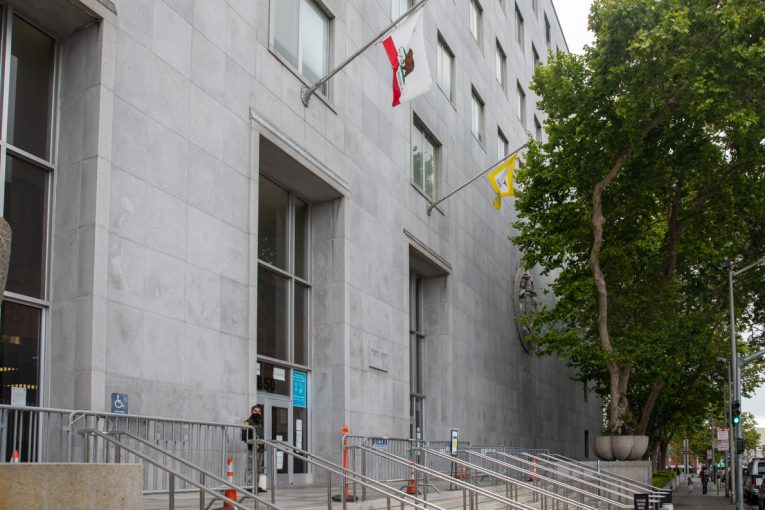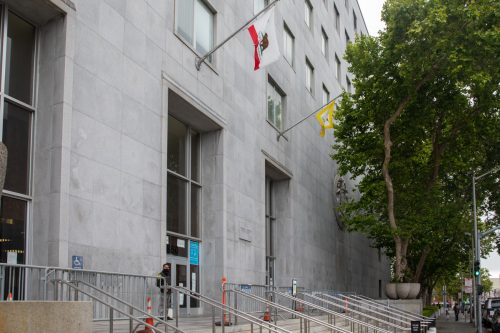

By Mitchell Barraza
SAN FRANCISCO, CA – San Francisco Superior Court Judge A. Marisa Chun denied a defense motion to reduce felony charges to misdemeanors here this week against trans woman Cameron Davis, who is still facing felony driving a stolen vehicle and receiving a stolen vehicle, and various misdemeanor charges.
In a preliminary hearing that spanned from mid-morning to mid-afternoon, the parties went back and forth on the motions.
It also came to light—in brief statements in court—that Davis had been assaulted while in recent custody, and also pushed to the ground during her arrest, resulting in injuries.
Attorneys Olivia Taylor and Benjamin Daniel Mercer-Golden from the San Francisco Public Defender’s Office oversaw Davis’ defense and her PC § 17(b) motion to reduce the felony charges against her to misdemeanors.
Mercer-Golden argued Davis has a long history of facing abuse and challenging circumstances, starting at birth when her birth mother refused to take her home from the hospital. Davis was born without a right hand, and later had a partial amputation on one of her feet.
Her mother would eventually regain custody, leading to a cycle of abuse at her mother’s hands and Davis escaping to other relatives.
Despite these issues, Davis became a dancer and choreographer in the San Francisco community. When her dance studio closed, she went back to school, majoring in criminal justice and minoring in dance.
She transitioned to being a woman in her twenties.
She said that if she were able to have the charges reduced and go on with her life outside of jail, she would return to dancing and choreographing.
Attorney En-Ta Tu of the District Attorney’s Office argued that there were several aggravating factors that made the felony charges appropriate, noting Davis is in the middle of a one-year probation period for another felony, and violating that probation was a strong reason for denying the motion.
While expressing empathy at Davis’ circumstances, Judge Chun declined to reduce the charges, stating the arguments on Davis’ life experience were better left “for other motions.”
The court also tackled the question of whether the prosecution had enough evidence to bring the charges against Davis. Both parties agreed that one of the charges should be dismissed, and the court did so, leaving four charges intact.
Attorneys Taylor and Mercer-Golden argued the court should exclude evidence gained from Davis’ arrest, as the reporting officer didn’t have a warrant to arrest her.
Prosecutor Tu argued the arrest was proper, and the evidence should be admitted. He called SFPD Sergeant Caraway, the reporting officer, to testify. He also moved to add the body camera footage from the incident to the record.
Sergeant Caraway testified he was patrolling the Tenderloin when he saw Davis driving a white pick-up truck against traffic on a one-way street. He pulled the truck over in a routine traffic stop.
When asked for identification, Davis produced a man’s driver’s license, which she later said was the license of friend of hers. Sergeant Caraway ran the license and the truck’s plates through dispatch, which alerted him that the truck had been stolen recently.
Sergeant Caraway testified to then removing Davis from the vehicle, at which point she correctly identified herself, and cooperated with Sergeant Caraway’s questions and efforts to detain her after the sergeant knocked her to the ground, where she suffered some cuts and bruises.
Sergeant Caraway’s body camera captured him giving Davis her Miranda warnings, then interrogating her about driving the stolen vehicle.
Davis said that she was driving the wrong way because she was visiting a friend and was unfamiliar with the area. She also said that she received the truck from a friend a while ago, and hadn’t known that it was stolen, although she believed it “probably” had been stolen.
Sergeant Caraway testified that the truck was undamaged and did not otherwise look like it had been hot-wired or tampered with when he stopped Davis in the Tenderloin.
The defense argued that the prosecution’s evidence didn’t establish intent for the charges of driving a stolen vehicle and receiving a stolen vehicle, and didn’t provide enough evidence to furnish a charge for driving without a license.
Judge Chun decided based on testimony from Sergeant Caraway and another SFPD sergeant that the prosecution had enough evidence to support its case against Davis and formally charge her at her arraignment March 22 before moving to a trial.

